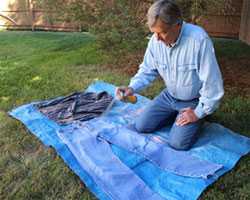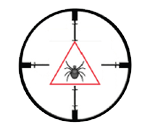It’s open season on ticks!
 Protect yourself, your family, and your pets from tick bites this hunting season. Hunting brings you in close contact with ticks and their habitats, so take the proper precautions to reduce your chances of being bitten. If you develop a fever or a rash following tick exposures, see your doctor immediately. Most tickborne diseases can be effectively treated if caught early.
Protect yourself, your family, and your pets from tick bites this hunting season. Hunting brings you in close contact with ticks and their habitats, so take the proper precautions to reduce your chances of being bitten. If you develop a fever or a rash following tick exposures, see your doctor immediately. Most tickborne diseases can be effectively treated if caught early.
Ticks can spread serious and potentially fatal diseases like tularemia, ehrlichiosis, Rocky Mountain spotted fever, and Lyme disease. While most tickborne infections occur during the summer, ticks may still be active well into the fall, or even year-round in warmer climates. Ticks live in grassy, brushy, or wooded areas, and on animals themselves, so hunting will bring you in close contact with ticks. Take the proper precautions this hunting season to keep you and your pets healthy.
Prevent tick bites
There are currently no vaccines to prevent tickborne disease in the United States, so avoiding tick bites and promptly removing attached ticks is the best way to protect yourself, your family, and your pets.

Treat gear and clothing with permethrin.
Before the hunt:
- Treat gear and clothing with permethrin. Products containing permethrin kill ticks. Permethrin can be used to treat boots, clothing, and camping gear. Permethrin remains protective through several washings. Always follow product instructions.
- Treat dogs for ticks. Dogs are highly susceptible to tick bites and tickborne disease. Regularly treat dogs with pesticides that kill ticks using products recommended by your veterinarian.
- Tuck your pants into your boots or socks and tuck your shirt into your pants to prevent ticks from crawling inside clothing.
During the hunt:
- When possible, walk in the center of trails and paths to avoid brushing up against ticks.
- Animals can carry diseases which may affect people, including brucellosis, tularemia and rabies. Consider wearing gloves when dressing or butchering game and washing hands thoroughly afterwards.
- Ticks may drop off recently killed animals and may be in quick search for a new host, which may include people. Pay particular attention to ticks during the transportation or dressing of animals.
After the hunt:
- Shower immediately after returning from the outdoors. Showering may help remove unattached ticks.
- Perform full body check to look for ticks. Use a mirror, or have someone help you with hard-to-see areas. Ticks commonly attach to people in the following areas:
- Under the arms
- In and around the ears
- Inside belly button
- Back of the knees
- In and around the hair
- Between the legs
- Around the waist
- Check dogs for ticks after returning from tick habitats. The most common location for ticks on dogs include the ears, arm pits, groin and between the toes.
- Remove any attached ticks from people or pets immediately. To remove a tick grasp it with tweezers, as close to the skin as possible, and pull it straight out. Do not twist or jerk. For detailed information about tick removal, see the tick removal page.
Watch for signs of illness in people and pets in the weeks following tick exposure, even if you don’t remember being bitten by a tick. Most tickborne diseases can be treated effectively if caught early, so see your health care provider immediately if you develop a fever, rash, or flu-like symptoms. Be sure to mention to your doctor any history of tick bites or outdoor activities where you might have been exposed to ticks.
Tickborne diseases in the United States
Ticks can carry a wide range of bacteria, viruses, and parasites which can make you or your pet sick. Hundreds of thousands of cases of tickborne disease occur every year in the United States. Illnesses can range from very mild to life-threatening and may progress rapidly. See your doctor right away if you develop a fever, rash or flu-like illness following contact with ticks or their habitats. Remember, most tickborne diseases can be effectively treated if recognized early.
Note: Most tickborne diseases are spread through the bite of an infected tick. However, the bacteria that cause tularemia can be spread through the bites of ticks and deer flies or during contact with infected animals and their carcasses. For hunters, this commonly occurs when skinning or processing infected animals including rabbits, muskrats, prairie dogs and other rodents. Gloves should be worn when handling any sick or dead animal. Hunting dogs can also contract tularemia if they’ve been in contact with infected rodents or rabbits. If your dog develops a fever, becomes depressed or loses its appetite, see your veterinarian immediately.
Remember…on your next hunt, target the tick:

- Treat your clothing with permethrin
- Tuck your pants into your boots or socks
- Shower after returning from the outdoors
- Check for ticks on people and pets
- If you develop a fever or rash, see your doctor immediately
For more information about diseases that you can get from a tick bite see our websites:
- Anaplasmosis
- Babesiosis
- Ehrlichiosis
- Lyme disease
- Rocky Mountain spotted fever
- Heartland virus
- Southern tick-associated rash illness
- Tick-borne relapsing fever
- Tularemia
Other diseases that you can get from a tick in the United States include Colorado tick fever and Powassan virus.
- Page last reviewed: November 4, 2015
- Page last updated: November 4, 2015
- Content source:
- National Center for Emerging, Zoonotic, and Infectious Diseases, Division of Vector-Borne Diseases
- Page maintained by: Office of the Associate Director for Communication, Digital Media Branch, Division of Public Affairs




 ShareCompartir
ShareCompartir